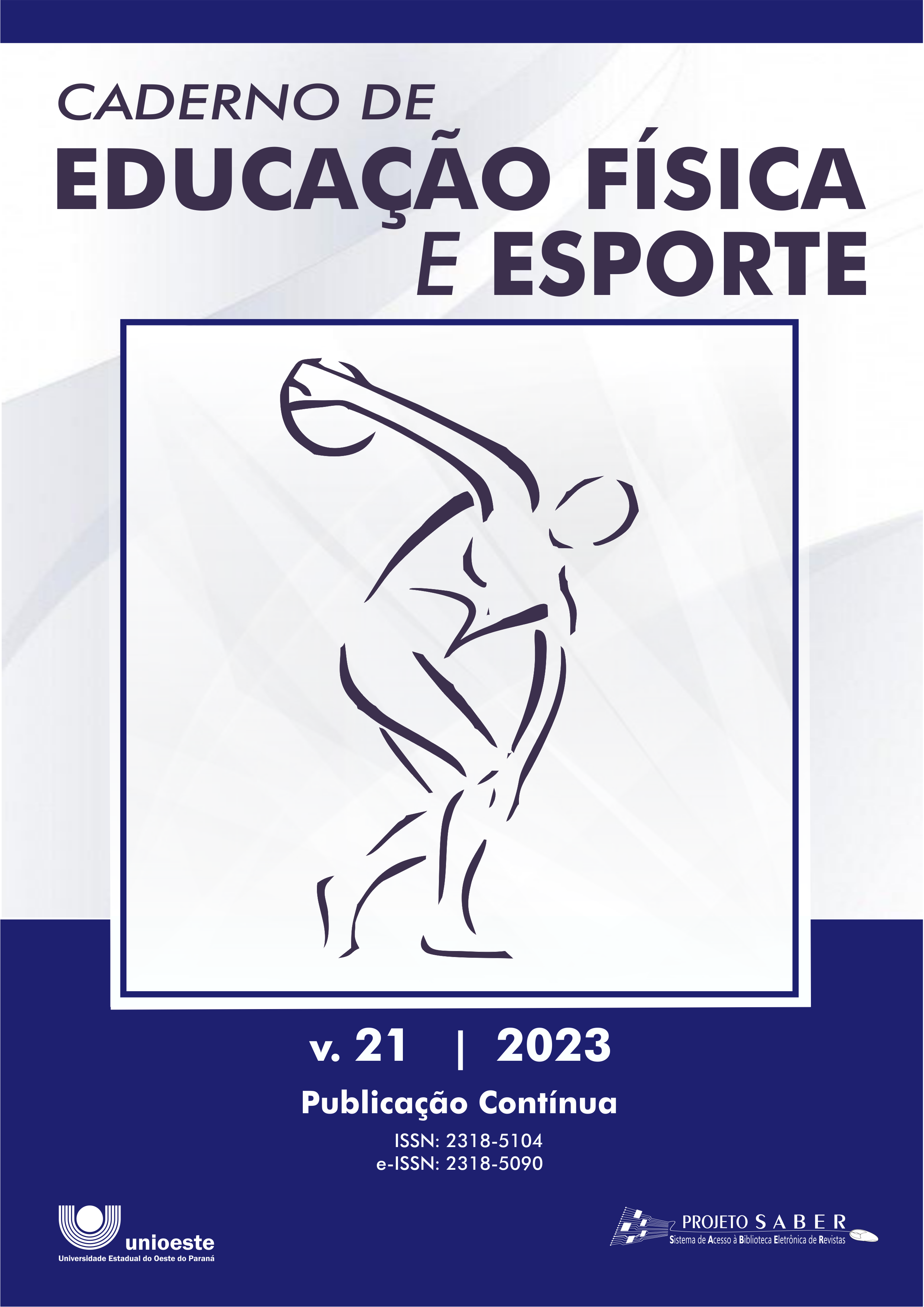Situações etnográficas reversas: reflexões sobre construções culturais no contexto futebolístico
DOI:
https://doi.org/10.36453/cefe.2023.31058Palavras-chave:
etnografia, cultura, reversibilidadeResumo
INTRODUÇÃO: Este estudo busca explorar episódios vivenciados por meio de espaços futebolísticos, provocando reflexões sobre as relações etnográficas em campo e a necessidade de uma abordagem mais equilibrada e valorização dos saberes nativos.
OBJETIVO: Explorar as perspectivas de reversibilidade e cultura em contextos etnográficos, destacando a interação entre pesquisadores e participantes nativos na cocriação do conhecimento na Educação Física e ilustrando as diferentes abordagens das construções culturais.
MÉTODOS: A pesquisa foi realizada por meio de uma etnografia. Os dados foram construídos por meio de observação direta, entrevistas formais e informais, convivência-participante e diários de campo.
RESULTADOS: Os principais resultados deste estudo mostram que a cultura é construída de forma colaborativa nas relações entre etnógrafos e nativos. Ambos os participantes são ativos na produção do conhecimento acadêmico, por meio do compartilhamento de símbolos que dão origem a construções culturais heterogêneas e difusas.
CONCLUSÃO: Conclui-se que é importante que haja um diálogo acadêmico de tal modo o mais equilibrado possível entre observador e observado na produção do conhecimento, bem como apresenta uma reflexão mais ampla sobre essa dinâmica em contextos etnográficos.
Downloads
Referências
ABU-LUGHOD, L. Writing against culture. In: FOX, R. (Ed.) Recapturing Anthropology. Santa Fe: School of American Research, 1991. p. 137-62.
BERREMAN, G. D. Etnografia e controle de impressões em uma aldeia do Himalaia. In: GUIMARÃES, A. Z. (Org.). Desvendando máscaras sociais. Rio de Janeiro: Francisco Alves Ed., 1975. p. 123-174.
BOEHL, W. R.; MYSKIW, M. Uma breve análise das relações entre intermediários e jogadores de futebol menores de 16 anos. Caderno de Educação Física e Esporte, v. 19, n. 2, p. 27-33, 2021. DOI: http://dx.doi.org/10.36453/cefe.2021.n2.27215
FAVRET-SAADA, J. Ser afetado. Cadernos de Campo, v. 13, p. 155-61, 2005. Disponível em: https://www.revistas.usp.br/cadernosdecampo/article/download/50263/54376
FONSECA, C. O anonimato e o texto antropológico: dilemas éticos e políticos da etnografia ‘em casa’. In: SCHUCH, P.; VIEIRA, M. S.; PETERS, M. (Orgs.). Experiências, dilemas e desafios do fazer etnográfico contemporâneo. Porto Alegre: UFRGS, 2010. p. 205-27.
GEERTZ, C. A interpretação das culturas. Rio de Janeiro: Jorge Zahar, 1978.
GOLDMAN, M. O fim da antropologia. Novos estudos CEBRAP, n. 89, p. 195-211, 2011. DOI: https://doi.org/10.1590/S0101-33002011000100012
INGOLD, T. Anthropology is not ethnography: Radcliffe-Brown lecture in social anthropology. In: JOHNSTON, R. (Ed.) Proceedings of the British Academy, Volume 154, 2007 Lectures, 2008. p. 69-92. DOI: https://doi.org/10.5871/bacad/9780197264355.001.0001
LARAIA, R. de B. Cultura: um conceito antropológico. Rio de Janeiro: Jorge Zahar, 1986.
LATOUR, B. Jamais fomos modernos. São Paulo: Editora 34, 1994.
MAGNANI, J. G. C. Festa no pedaço: cultura popular e lazer na cidade. Unesp, 1998.
MALUF, S. W. A antropologia reversa e “nós”: alteridade e diferença. Ilha, v. 12, n. 1 e 2, p. 41-58, 2010. DOI: https://doi.org/10.5007/2175-8034.2010v12n1-2p41
MIGNOLO, W. Local histories/global designs: Coloniality, subaltern knowledges, and border thinking. Princeton: Princeton University Press. 2000. Disponível em: https://www.degruyter.com/document/doi/10.1515/9781400845064/html
MYSKIW, M. Nas controvérsias da várzea: trajetórias e retratos etnográficos em um circuito de futebol na cidade de Porto Alegre. 2012. Tese (Doutorado em Ciências do Movimento Humano) - Universidade Federal do Rio Grande do Sul, Porto Alegre, 2012. Disponível em: http://hdl.handle.net/10183/67002
PEIRANO M. A favor da etnografia. Rio de Janeiro: Relume-Darumá; 1995.
PINHEIRO-MACHADO, R. La garantía soy yo. Redes locais e transnacionais de comércio popular – camelôs e sacoleiros (Brasil-Paraguai). 2005. 143f. Dissertação (Mestrado em Antropologia Social) - Universidade Federal do Rio Grande do Sul, Porto Alegre, 2005.
PISANI, M. S. Poderosas do Foz: trajetórias, migrações e profissionalização de mulheres que praticam futebol. 2012. 166f. Dissertação (Mestrado em Antropologia Social) - Universidade Federal de Santa Catarina, Florianópolis, 2012. Disponível em: http://repositorio.ufsc.br/xmlui/handle/123456789/100982
ROCHA, A. L. C. da; ECKERT, C. Etnografia: saberes e práticas. Iluminuras, v. 9, n. 21, 2008. Disponível em: https://www.lume.ufrgs.br/bitstream/handle/10183/30176/000673630.pdf
STRATHERN, M. A pessoa como um todo e seus artefatos. In: STRATHERN, M. O efeito etnográfico: e outros ensaios. São Paulo: Cosac Naify, 2014. p. 487-509.
VIVEIROS DE CASTRO, E. O conceito de sociedade em antropologia. In: VIVEIROS DE CASTRO, E. A inconstância da alma selvagem: e outros ensaios de antropologia. São Paulo: Cosac & Naify, 2002. p. 295-316.
WAGNER, R. A invenção da cultura. São Paulo: Cosac & Naify, 2010.
Downloads
Publicado
Como Citar
Edição
Seção
Licença
Copyright (c) 2023 Direitos Autorais Partilhados

Este trabalho está licenciado sob uma licença Creative Commons Attribution-NonCommercial-ShareAlike 4.0 International License.
Os direitos autorais permitem descarregar, compartilhar, copiar, distribuir, adaptar, transformar, exibir, reproduzir a totalidade ou partes do artigo para qualquer propósito legal, desde que não tenha fins lucrativos e seja citada a fonte.
Informamos que todo o conteúdo do texto publicado, e dos seus possíveis erros ortográficos e gramaticais, é de inteira responsabilidade de seus autores, não cabendo ao Caderno de Educação Física e Esporte, ou aos nossos Avaliadores Ad Hoc, por qualquer implicação legal ou por eventual negligência à língua portuguesa ou à estrangeira.























